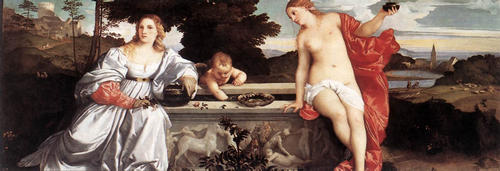| Renaissance | 2003-02-07 14:45 10 comments |
 by Flemming Funch In times of change it can be useful to look back at other times of cultural change, at least those that can be considered successful in retrospect. The Renaissance was one of those periods. 'Renaissance', is French for 'rebirth'. It describes the intellectual and economic changes that occurred in Europe from the fourteenth through the sixteenth centuries. Europe emerged from the stagnation of the Middle Ages and experienced an age of artistic, social, scientific and political innovation and new thought, as well as financial growth. The Renaissance is usually considered to have originated in Florence, Italy. Fifteenth-century Florence was a self-governed, independent city-state. The basis of its economic success was its twelve artist guilds that regulated the trades. Wealthy guild members held position in government and were very influential in both society and politics. Because of its strong economy and a political philosophy that was dedicated to the welfare of the city, Florence thrived. The Florence banking business was also a foundation for its success. The Florentine gold coin known as the florin was of such reliable purity that it became the standard coinage throughout Europe. Many factors contributed to the emergence of the Renaissance throughout Europe: Gutenberg invented the printing press in 1445, which made it possible to more widely read about philosophy and science, and the stranglehold of the church was diminished. And people started to read 'classics', texts from ancient Greece and Rome, which had been completely ignored for centuries. That inspired a re-cycling and re-invention of good things from many sources. Improvements in navigation and map making made it possible to travel farther than before, and there was a lively trade, bringing in exotic spices and gems and fabrics from foreign lands. Architecture was inspired by the ancient Greeks and Romans, and by newfound mathematical principles, and a fascination for harmonious proportions, the golden mean, symmetry. There were also many negative factors that have inspired the need for an explosion of innovation. Europe had been devastated by the plague, kept in the dark by the church, and life had just been hard work and misery for most people. Any of that we can use today? Well, it was about bringing in many different new and old influences. It was about an increased ability to communicate information in writing. It was about advances in science that made it possible to understand the world better. It was about incrased ability to trade. It was about versatile geniuses who were both artists, scientists, philosophers, architects and politicians, who would weave these many influences together. ...All of which might very well apply to our situation now, with the Internet, and suddenly increased facilities for interacting with cultures and with knowledge we were isolated from before. Here are some references on the Renaissance: [link] [link] [link] [link] [link]. |